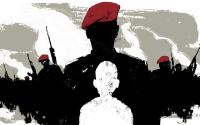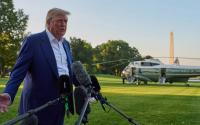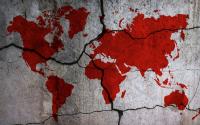Published on Thursday, July 17, 2003 by the Atlanta Journal-Constitutionby Jay Bookman
Some people are born humble. Others have humility thrust upon them.
Defense Secretary Donald Rumsfeld, for example, was asked in a recent interview whether he still had faith in prewar intelligence claiming a link between Saddam Hussein and Osama bin Laden.
"I think that the, the, information we had over a period of time that I cited that the intelligence community gave to me and I read as opposed to ad-libbing was correct. It, it, it was carefully stated . . ."
Talk about carefully stated.
It's telling to see the bantam rooster of the Bush administration turn so halting and defensive, insisting that, hey, he had only been reading what somebody else handed him. Then again, there's a lot of that going around these days.
In fact, if Vietnam was the place where America lost her innocence, Iraq may be the place where we lose our arrogance.
The once-triumphant Richard Perle has gone underground. The sublimely smug William Kristol, editor of the Weekly Standard and stalwart champion of empire, no longer looks as though he just swallowed a canary. Crow is more like it. And we've heard more from Saddam Hussein in recent weeks than from Deputy Defense Secretary Paul Wolfowitz.
Maybe because Saddam, unlike Wolfowitz, has a plan that's actually working.
The humility of Rumsfeld and others, while belated, is well-earned. Too many of our soldiers are still dying. Too many others, living every day with the knowledge that an attack could come from anywhere, now find themselves acting with the brutality that has long been required of occupying forces. The transformation is no doubt necessary for their self-defense, but it may haunt their nights for years.
Contrary to previous assurances, our top generals now admit that we will be stuck in Iraq for years at a current cost of a billion dollars a week, not including substantial reconstruction costs. The need to keep at least 150,000 soldiers stationed in Iraq for the foreseeable future also means that our military will be seriously overextended for a long time.
Globally, the credibility of the United States is in tatters. At a time when both North Korea and Iran truly do seem to be moving toward a nuclear capability -- as contrasted with the fictitious nuclear program attributed to Iraq -- we find ourselves in a weak position, both militarily and diplomatically, to challenge them.
We've even been reduced to asking, all but begging, other nations to contribute troops to Iraq, but most are declining. They want no part of a war that they advised against, a war they were ridiculed by U.S. officials for opposing, a war that now seems to be going bad.
Anybody can make mistakes, of course. But mistakes born of arrogance are particularly hard to accept, and our leaders made plenty, right from the beginning. The United Nations would never dare to withhold its approval for an invasion, yet it did. The Iraqi people would welcome us with parades and confetti, but instead it's been rocket-propelled grenades. Weapons of mass destruction posed a grave threat to our safety of our loved ones, yet so far none has been found.
And the notion that we could create a democratic Iraq to serve as a beacon to the rest of the Islamic world is now exposed for the romantic claptrap it had always been.
For a year now, Rumsfeld, Wolfowitz, Vice President Dick Cheney and others have treated U.S. intelligence agencies as little more than public-relations flacks, tasked to produce propaganda that the CEO needed to sell a product. They drew up no Plan B in case they were wrong about Iraq, because the notion that they could be wrong never entered their minds. Any who dared suggest otherwise were dismissed as fools, traitors or appeasers.
Even when smart people, experienced people, such as Army Chief of Staff Eric Shinseki, tried to tell them that an occupation of Iraq might be expensive and require a lot of manpower, Rumsfeld and Wolfowitz publicly scoffed.
And in that willful blindness, they have led us here.
Today, and tomorrow, and for the foreseeable future, our men and women in uniform will be dealing with the consequences of their leaders' misinformed arrogance. But surely, those who made the mistakes should face consequences, too.
"If Donald Rumsfeld was here," Spc. Clinton Deitz of the 3rd Infantry Division told ABC News in Baghdad, "I'd ask him for his resignation."
Jay Bookman is deputy editorial page editor.






